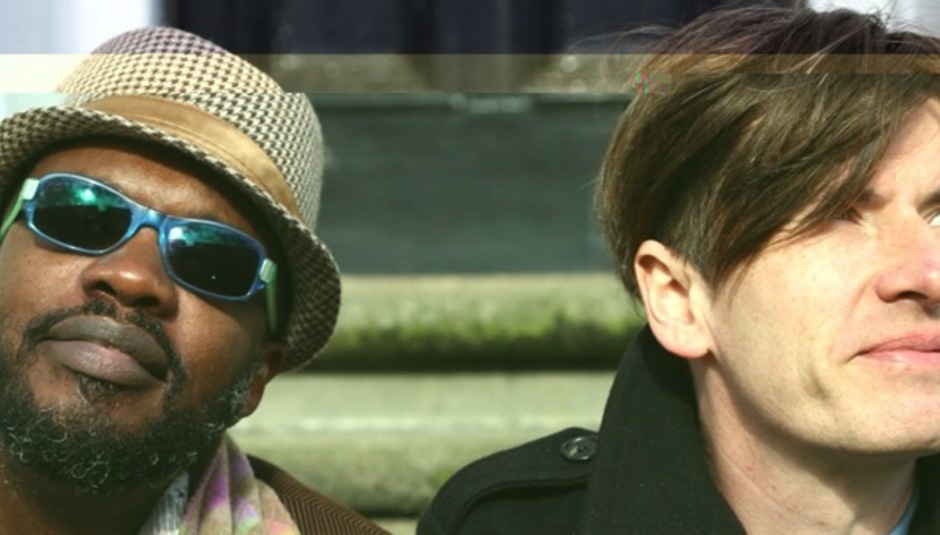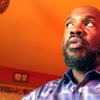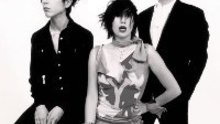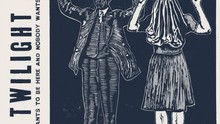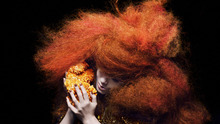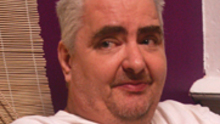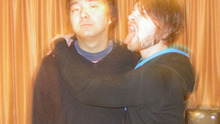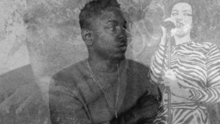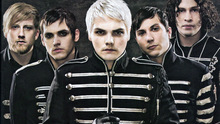Normally reissues of classic albums come about because of anniversaries, or nostalgia. McAlmont & Butler’s happened because guitarist and producer Bernard Butler discovered you could buy the original version for a penny. “There's this thing called the ‘1p Album Club’ on twitter, where they find albums that cost 1p on Amazon” he explains, “They wrote this really nice piece. It wasn't all good, but he got it pretty spot on and it got me thinking about it again.”
Handily, after a little record company to-and-fro, that thinking became a deluxe reissue, coinciding with the twentieth anniversary of The Sound of McAlmont & Butler, (Not that its creator is fond of big anniversaries: “I'd have been happy with the 16th anniversary! What's wrong with that?” says Bernard) an album that was never meant to exist in the first place.
“It’s important to remember that the project started with Bernard wanting to write a really happy song and create a single moment in pop,” explains singer David McAlmont, “but because of the industry that we're working in we had this whole machine of people around us pushing us to do more. It's not really what Bernard wanted to do at the time, and not really what I wanted to do either. It shouldn't have been any more than [debut single] 'Yes'. That we have The Sound Of... is quite amazing really.”
What emerged from a chance meeting at London’s Jazz cafe between a guitarist and a singer both at a loose end following acrimonious splits with their respective bands, Butler from brattish glammo’s-turned-swooning-balladeers Suede, and McAlmont from Cocteau influenced pop duo Thieves, was a curious project. Butler got his “perfect moment in pop” in ‘Yes’, the duo’s peerless debut single, but no-one would let them stop there. Singles begat b-sides, record companies demanded further singles, and more studio time, and before anyone had really noticed what was happening McAlmont & Butler had made an album. “We kind of got press ganged by management and the publisher,” says McAlmont. “They’d say ‘it's going really well, the single is going to be big enough that want you to do more…’ and that's how we ended up with an album. It's a twist of fate.”
But then spontaneity and twists of fate is pretty much the whole point of McAlmont & Butler. “I think that makes it pretty eccentric, it shoots off in different directions.” says Butler, “We'd go into the studio for little sessions, we'd do a weekend and get two songs and that would be it. Then you'd do more the next month. Each time the songs were written very quickly, sometimes the day before. It's all about the spontaneity. About putting each other on the spot, I was putting David on the spot, but I was a bag of nerves really.”
“We were just putting brilliant musicians in a room and seeing what could happen.” he explains “That's what fascinated me at the time. I knew I wanted something explosive to happen, and something beautiful to happen. I wanted each song to go against what we'd done before.”
Even Butler’s decision to let future-maestro Nigel Godrich engineer the sessions was a spontaneous one, “he was the tape-op at Rak studios and the engineer we'd hired didn't turn up,” explains Butler, “so Nigel spent all day saying ‘I can do this, let me do it!’ and I was thinking ‘you're just the bloke who makes the tea!’ but by the next day he was doing everything. I worked with him for a couple of years after that, and he was great. So we stumbled across people like that.” It’s a chance happening, he says, typical of the sessions, “We were all the same age, it was an exciting time in our lives where we were starting to develop and learn stuff. I was going in there pretending I knew what I was doing and bringing a load of musicians with me. It was all on the spot. All exciting stuff, not thought out.”
The result was an accidental classic - The Sound of McAlmont & Butler is technically a compilation album, the duo’s complete studio works up to that point. By the time it came out they’d practically stopped working together, and wouldn’t reunite properly until 2002’s Bring It Back.
On its 20th Anniversary (sorry Bernard!) We sat down with the pair in Butler’s snug East London studio to go through the album track by track.
Yes
DAVID McALMONT: What I like about is that it's very gay. That's my view of it. Bernard said he'd listened to loads of Dusty as part of researching the sound of this record, a particular period of Dusty, and the melody I added was very much inspired by the sort of thing I imagined Judy Garland would do. Someone asked at the time "if you were to say a sentence about the song what would it be?" and I said "It's an 'I Will Survive' for the 90s." So I see it as a very gay record, and I love it for that. But Bernard can add his heterosexual view.
BERNARD BUTLER: I just wanted to write a big gay record! [laughs] Actually I guess the cliche of "the gay record", to me they're just great pop songs. I grew up revering those records anyway. Beautiful pop records, not knowing about that perspective at all. I happily listened to 'Dancing Queen' next to the Smiths and New Order. At the time I was listening to Dusty, but not "cool" Dusty. I wasn't listening to Dusty In Memphis or anything like that- I was listening to The Best Of Motown and a K-Tel Dusty best-of with 'I Only Wanna Be With You' on it. I listened to that at full volume until the speakers distorted. I wanted to do something like that, with the strings and drums really loud and interesting key changes. I wanted to learn how to do that. This was the summer of 1994, around the time I left Suede, probably the week after, when I was sitting around at home being miserable. I did it one afternoon.
DM: We were very much a generation that was making “Mum and Dad” records. That's one of the things that appealed to me, Bernard said a few words to me at the Jazz Cafe when we met, that night. One thing that jumped out at me was "Dusty Springfield." A lot of people were interested in Bacharach and Dusty and motown and the music our Mums and Dad's were listening to when we were growing up. Apparently even the Drum N’ Bass that appeared at the time was very much from the soundtracks to things like James Bond films.
DiS: It's a really positive record, it just lifts and excites you immediately. It almost reminds you of something like 'Don't Stop Me Now’ (also a massively gay record!) Is that because what came before was such a dark period? Is it you suddenly feeling released?
BB: I would have tried to do something like this with Suede anyway, that would have been where I'd have gone next. That last record I made with Suede, a lot of it was quite heavy stuff, but that doesn't mean I was being heavy, it doesn't mean I was unhappy. That's just what we liked doing, we were happy making music like that. In the same way this record, with 'Yes', 'You Do' and 'How About You', they’ve got that sort of strange flamenco darkness to them. I don't think it means you have to be a happy person just because you've written these song.
DM: Even though Bernard's aspiration for it, if I'm not mistaken, was to make a really joyous record, the lyric I had for it was pure vitriol. It was a really bitter, twisted lyric about being dumped and imagining what I'd say to the person who dumped me when I became famous, which was a real risk to take. It all depended on the record succeeding or it would have been ridiculous. The experience of the last 20 years, of going around the country and doing everything I've done since, is that you meet women up north, for example, who were in really difficult relationships at the time, and heard the record and found the courage to walk away. At first I wasn't sure how to respond to that information- these days I just stay "thank you" because it's a complete sentence. I've let it go now. It's public property, it no longer belongs to us and I quite like that.
What's The Excuse This Time
BB: We'd done 'Don't Call It A Soul' and 'How About You' just before, which were the antidotes to 'Yes', they’re down acoustic things, so 'What's The Excuse...' was a sort of jokey Prince thing. That was the idea behind it. It was the first time we'd been in the studio with the band doing something quite snappy and quite fun.
DM: It's interesting, because that's another comment on the curious communication we had at the time. I didn't know until quite recently that one of the references for that was Prince, but I totally got Prince from it. Not in a way whereby I listened to it and thought "this sounds like Prince" but that what I came up made me think "why have I written something so Princey?" even to the point of being a bit jokey and rude. I like it because the verse sounds quite American to me, but the chorus reminds me of T-Rex.
BB: People wanted it to be a single at the time. 'Yes' didn't get much radio play at first and people were playing 'What's The Excuse This Time' instead because it was snappier. Then 'Yes' became a hit, and it was forgotten about.
The Right Thing
BB: That's a sort of swampy blues thing. Quite emotional. Quite taught. Being in a group, you feel like you're tied to a machine, and tied to doing certain things. Looking back at Suede, that wasn't really true, because I could do what the fuck I wanted, but it didn’t feel like that at the time. Coming out of Suede, I finally felt I could do whatever I wanted. When you've got people that versatile around you, a fantastic singer, great musicians, you think "what can I do today? We can do ANYTHING! Let's do the blues! Let's be Prince! Let's be Dusty Springfield!" It was bouncing all the time, yo-yoing quite extremely. It was quite extreme emotionally, 'The Right Thing'. I remember telling David to sing through my AC30 and him looking at me going "...okay." That's the kind of thing that happened in those days. I didn't have to explain things. I got away with it.
DM: The first record I made, I was working with someone who was very into Liz Frazer and was very into the idea of lyrics that were interesting, but didn't actually say much. Working with Bernard was the first time I felt able to say what was on my mind. I remember that period, the whole look and everything was quite militant. I remember one friend that saw us said 'The Right Thing' was a Queer Rock epiphany. It was definitely about loving each other, but love not being the answer, the two of us belong together and therefore it's the right thing to do. I was a bit concerned about where Bernard had been and him thinking "oh dear, not somebody else bringing their queer stuff to my music" but he was fine with it.
BB: Everyone has this thing about that with me, like I'm some sort of four year old who doesn't really get it. It was like that in Suede as well. For me it was more "whatever", I didn't care at all. I wasn't going "Here we go again, another gay thing, and here's me sitting with my pint watching the birds". It wasn't really like that. I really enjoyed the fact that we did that when all the really laddish things were happening in culture. I was settled and had been for years in my sexuality- it didn't matter. Sensibilities in music were far more interesting.
DM: I've always said I wouldn't have been as "out'" lyrically if Marc Almond and Boy George and Jimmy Somerville hadn't come before. I guess that music was very much in the decade before though, so it did seem quite fresh and unusual at the time.
Although
BB: This is definitely the most Etta James inspired thing, the most sweet soul. Again very swampy and nasty alongside the sweet thing. I've always loved that.
DM: I was very concerned as a friend at the time had been diagnosed HIV positive. I didn't know then but I had good reason to be positive about the future because of all the progress that's been made with the treatment of HIV, but back then, when he got the news I thought "oh my god, he's dead." It's a bit of an anachronism because of that, me not knowing what was to come. In some ways I'm a bit uncomfortable in what I wrote now. Another friend who was HIV was quite bothered by it, because he didn't want to look at his future in terms of death, he was more concerned with survival. I wouldn't have written that now, because I know better, but back then I was quite afraid for my friend and it came out in that way.
Dis: I suppose every song, musically and lyrically, is very immediate, it's the world as you saw it then?
DM: It is a bit of a time capsule. What I find striking, as we have these conversations 20 years later, is how gay I am on that record. I think with previous material I definitely did hide, and I haven't hidden since. What I did with Bernard on this record was a turning point in the way I express myself.
Don't Call It Soul
DM: I was learning how to play guitar at the time, and I was hesitant to ask the guitarist of his generation to play something I'd written, but Bernard went with it, which is quite nice. I remember doing it live and it was quite special. The lyric was quite an arrogant one, whereby I have a conversation with Marvin Gaye and tell him how soulless music was these days. There's a big clue in the first line, "I have to tell you what's been going on" that's my way of indicating who I was talking to. It's interesting because lots of people have had different interpretations of what that song is about. A lot of people thought it was me talking about my musical preferences, but actually it's a poem to Marvin Gaye.
Disappointment
BB: A band in a room, making a big noise, and then leaving a space in the middle. I did that with Suede as well, I've done it on lots of records, where you go in and say "we've got a song here and this bit in the middle we're just going to sit on the key and see what happens" and you just see what people do. There's a lovely bit where it drops down to piano, and then it comes back up, and I got this sax player who came down, nailed it in two takes and then I never saw him again. It was lovely. The thing is to create an environment where people can play, or sing about whatever they want, and at some points create some pressure, the idea that you need to do something exciting. At the time I was a bit scarier than I am now, I definitely had a mission- pack instruments into a car, go to the studio and say "let's be amazing." Trying to create a place where we could be emotional, where I could get all this stuff out emotionally. That's what I wanted to happen with everybody, even the sax player who comes down for an afternoon. We were all completely honest, whether with words or melody, or music, we were just feeling the emotion of it. You have the chance to come in for the afternoon, be amazing, and then carry on with your life. Any second we're going to have to get a real job, so come in here and do something extraordinary.
DM: It's funny, I think about it now and I was enormously free, vocally, on this record in a way that I hadn't been before. Before that it was about carefully placed sounds and getting it right, but with 'Disappointment' I found myself at the mic making vocal sounds that were odd, or doing things to my voice that would properly make my singing teacher slap me on the wrist. I love electric guitar anyway, but to have that big sound, that jammy, experimental feeling flying around, I felt able to do anything. Especially when we come back in after the instrumental- I felt "wow, I'm doing this and I'm getting away with it. Fantastic." When we did it in Islington last year that break down was wonderful.
Interval
BB: It was the end of the recording of 'How About You', we did it at my flat and we put it on as an 'End of Side One' thing, like it was the point you flipped the record over, even though it was a CD. I don't know really. It's just a nice piece of music.
The Debitor
BB: It's a pretty nasty, glammy track, probably from listening to 'Lust For Life' and 'Raw Power' and stuff like that. I know that it was another "what can we do today that's completely different." moment. I did as many styles as I wanted to, knowing I was with people who could do something interesting with them.
DM: I found the music for 'The Debitor' quite slutty, so I had to figure out a way to be an authentic tramp on record. The solution was to write about the abuse of being a paid-for musician on a label. The whole lyric was about the people that paid me, and the liberties they take, and what they reduced me to. That was the concept.
How About You
BB: 'How About You' is my favourite song on the record. I remember standing and playing the outro guitars and being quite emotional. It's a funny thing, sometimes, recording music. I do a lot in here, on my own, playing guitar. It's an odd thing, you’re standing there, you play along to things at loud volume, and you have to build yourself up to it. Sometimes I do it for hours or days, working on one part, to get the write emotional feel, your fingers against the wood, all that kind of stuff. Then you turn it off and the phone goes and you switch into being an ordinary human again, thinking "what the hell was that about?" It's an odd thing. In front of an audience is one thing, but you forget musicians are doing that all the time on their own as well. For me, personally, on some of the records I've made, some of the Suede records and this particularly, I know exactly where I was emotionally. When you create music like that, you create an environment, an ambiance for someone like David to do the same thing. You don't have to write it down, you create that feeling and it cuts across. I don't have to wait 20 years to tell you about it for you to get it. That's why we listen to music. That's the whole point of this record, that's why it's called "the sound", the whole point was to create a sound, something to come out of the speakers with no picture. No dance routine, or video or sleeve, none of that matters. It comes out of the radio in your kitchen and you hear it for the first time and it blows you away, that's what I wanted to happen. An idealistic rush of emotion. It was about capturing that moment.
DM: I was having a conversation the other night about the inherent melancholy of disco music. I think in some ways 'How About You' is a disco record without the disco. The atmosphere is exquisite, it's incredibly melancholy and it really captures the disco atmosphere of being out at night and having a limited amount of time to score, to have fun, to forget who you are, but it strips the drums and all of that away. I thought a disco record like that could be really interesting. I really like the sadness of it. I was becoming quite acquainted with the lonely, isolated experience of going out and looking for trade in gay clubs in London, that's what I bought to it lyrically, that disappointment and resignation you sometimes have when you get drunk enough and think "you'll do." A few years later the Mayor of Camden met me and said he thought 'How About You' was probably the greatest ever record about cruising. I was really pleased to hear that.
BB: There's so much disappointment and loneliness about being young, and it's often not talked about. Being young is about "what's going to happen tonight?" "what are they doing over there?" "what will happen when I'm older?" The constant disappointment of it not happening. People don't talk about the sadness very often. At that time, the summer of Britpop, things were supposed to be very exciting and you forget how much disappointment was involved in all of that. A lot of the music that came out of it doesn't reflect it in terms of atmosphere. It was all "this is fun", it didn't reflect what people were really like, or how it ended up.
Tonight
BB: The original demo was this oompah thing that dated back to Suede times, but it sounded horrible. We kept the structure but totally transformed it into this very beautiful thing. It's my second favourite song. I remember doing it on a very hot night in July, and it being absolutely blissful. It was a really quiet thing. I remember we went to record the sound of Nigel Godrich's Post Office van. Nigel used to drive round in an old post office van with a sliding door, we had the idea that the end of the song would be the door slamming. We set up all of these mic's, he drove round the block so you could hear him arriving, and then the door slamming. While this is happening somebody set fire to the flats opposite and this argument broke out.
DM: Someone thought it was Michael Caine. Somebody tweeted me recently asking what Michael Caine movie we'd used!
BB: That really happened. Just a really hot night with people shouting.
DM: There's a resolve, a quiet determination to that record, I wrote it about Bernard, him kind of getting on with things after recent difficulties, and he didn't know that until this year.
BB: I don't know what to say about that. No-one had ever said that to me before. I don't imagine myself being in any of my songs, personally. It was a funny thing. I always thought it was the opposite, I thought it was autobiographical. I'm glad I didn't know that on the day.
You'll Lose A Good Thing
BB: 'You'll Lose A Good Thing' is a cover. Someone sent Barbara Lynn’s version to me and said "you should do this." I didn't really like it if I'm honest, I didn't like the recording, but I thought there was good chords and great words and a simple melody, and I had this idea that it could be very minimal and very 'Spirit of Eden' by Talk Talk. Very stripped and spiritual. I really wanted to do something like that, that week, and I got lucky. My friend heard it and said "what happened to the great record it could have been?" but I saw an opportunity to make something beautiful, with a hammond organ built up one note at a time, and me not playing guitar, that was quite important to the principle of it. To do something unexpected.
DM: I was really glad you made that decision, because when I heard the original song it didn't really speak to me. I knew there was something good going on, but it's not a record I'd play. We found ourselves in that classically experimental place again. Bernard took some tape and taped down the hammond keys to play an E-chord, and it left me free to do whatever felt right.
BB: It's just a drone. You tape down the keys and build it up. We did two takes and that was it. We did it last year at the Union Chapel and I was on the church organ.
DM: It was a real moment.
You Do
BB: 'You Do' was written as part of [Suede’s] Dog Man Star, we did a version of it, but Brett never did any lyrics or sang to it. It was too many songs, and we didn't have time. I'd always wanted to use it. I wrote 'Yes' in the same key, and the idea was that they'd both have the same chords in the chorus, but one’s at half speed, ones happy, and ones sad. The idea was to put out a 7" with 'Yes' and 'You Do' that were two sides of the same coin. One was incredibly uplifting, and one that the opposite. That's why they book end the record. Why it runs back into the start. That's the way it was intended, and what happens between was chaos and madness.
DM: It's definitely my favourite video project I've ever done. We spent the day at Paddington station. Bernard was amazing, throwing shapes all day at Paddington, rocking out with a broken string and shaggy hair. It was a great idea to put us in such an iconic London setting with that song. It really seems quite arrogant, the lyrics really assuming the higher ground, saying I'm bringing everything in a relationship and you're bringing nothing. It always takes two, but I was the one who could write their thoughts down and record them. The person who might have a response to that didn't have that access. It's really interesting in that way. It's another one I love on that album.
The Sound of McAlmont & Butler 20 Year Deluxe Remaster is out now. You can order the deluxe edition with signed print here.

